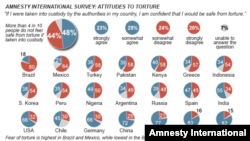LONDON —
Governments around the world are failing to keep the promises they made in the 1984 U.N. Convention on Torture, according to human rights group Amnesty International. Amnesty International says many countries are using torture systematically on a vast scale.
In his home city of Port Harcourt, Nigeria, Justine Ijeomah is known as 'Mr. Human Rights'.
In a region with high rates of poverty and crime, Ijeomah offers support to people arrested and held by authorities. He says many of the younger, poorer detainees suffer police brutality and torture.
He describes the torture police allegedly carried out on one detainee, accused of kidnapping.
"He was handcuffed. Also his two legs were handcuffed. Then they brought his two legs and hands, tied them together, then used a bar of iron coming cross over, so he was folded like this. And they hanged him. And they use machetes to flog his back," said Ijeomah.
Nigerian authorities deny the allegations. Ijeomah says he has been tortured on several occasions and it leaves deep mental, as well as physical scars.
"He can feel the pain afresh only just when you remind them about what they go through," he said.
It has been three decades since 155 countries signed the 1984 U.N. Convention Against Torture. But Amnesty International law and policy senior director Michael Bochenek says many of the signatories are ignoring the pledges they made.
"In many cases what we are talking about is the systematic use of torture in these countries," he said. "So there really is a divergence between the commitment on paper, and the reality in practice."
Bochenek says there are basic steps governments need to take to tackle torture.
"Conducting effective medical investigations, ensuring that lawyers are able to visit clients in detention and do so immediately, making sure family members have access to their relatives," he said.
In Brazil, 80 percent of respondents to an Amnesty International commissioned survey said they feared they would be tortured if detained by police, the worst performer out of the 21 countries surveyed.
In Nigeria, 50 percent feared torture if arrested.
"[Police] officers that perpetrate this act, none of them are brought to book," said Justine Ijeomah. "The level of impunity in Nigeria and some parts of Africa is really getting out of hand."
In the Amnesty International survey, three in four people in China and India said torture was sometimes needed to protect the public. The lowest figure was in Greece, where just one in 10 respondents thought torture sometimes necessary.
In his home city of Port Harcourt, Nigeria, Justine Ijeomah is known as 'Mr. Human Rights'.
In a region with high rates of poverty and crime, Ijeomah offers support to people arrested and held by authorities. He says many of the younger, poorer detainees suffer police brutality and torture.
He describes the torture police allegedly carried out on one detainee, accused of kidnapping.
"He was handcuffed. Also his two legs were handcuffed. Then they brought his two legs and hands, tied them together, then used a bar of iron coming cross over, so he was folded like this. And they hanged him. And they use machetes to flog his back," said Ijeomah.
Nigerian authorities deny the allegations. Ijeomah says he has been tortured on several occasions and it leaves deep mental, as well as physical scars.
"He can feel the pain afresh only just when you remind them about what they go through," he said.
It has been three decades since 155 countries signed the 1984 U.N. Convention Against Torture. But Amnesty International law and policy senior director Michael Bochenek says many of the signatories are ignoring the pledges they made.
"In many cases what we are talking about is the systematic use of torture in these countries," he said. "So there really is a divergence between the commitment on paper, and the reality in practice."
Bochenek says there are basic steps governments need to take to tackle torture.
"Conducting effective medical investigations, ensuring that lawyers are able to visit clients in detention and do so immediately, making sure family members have access to their relatives," he said.
In Brazil, 80 percent of respondents to an Amnesty International commissioned survey said they feared they would be tortured if detained by police, the worst performer out of the 21 countries surveyed.
In Nigeria, 50 percent feared torture if arrested.
"[Police] officers that perpetrate this act, none of them are brought to book," said Justine Ijeomah. "The level of impunity in Nigeria and some parts of Africa is really getting out of hand."
In the Amnesty International survey, three in four people in China and India said torture was sometimes needed to protect the public. The lowest figure was in Greece, where just one in 10 respondents thought torture sometimes necessary.






